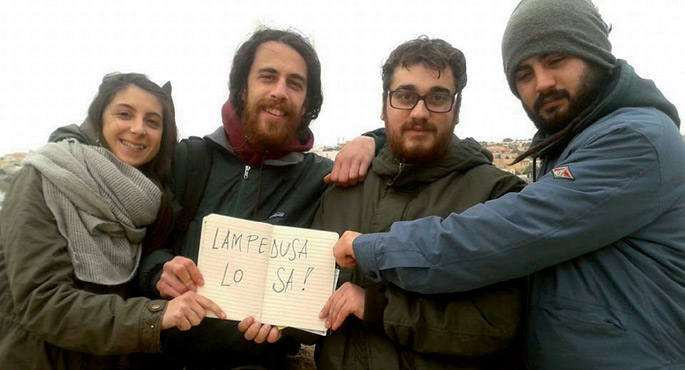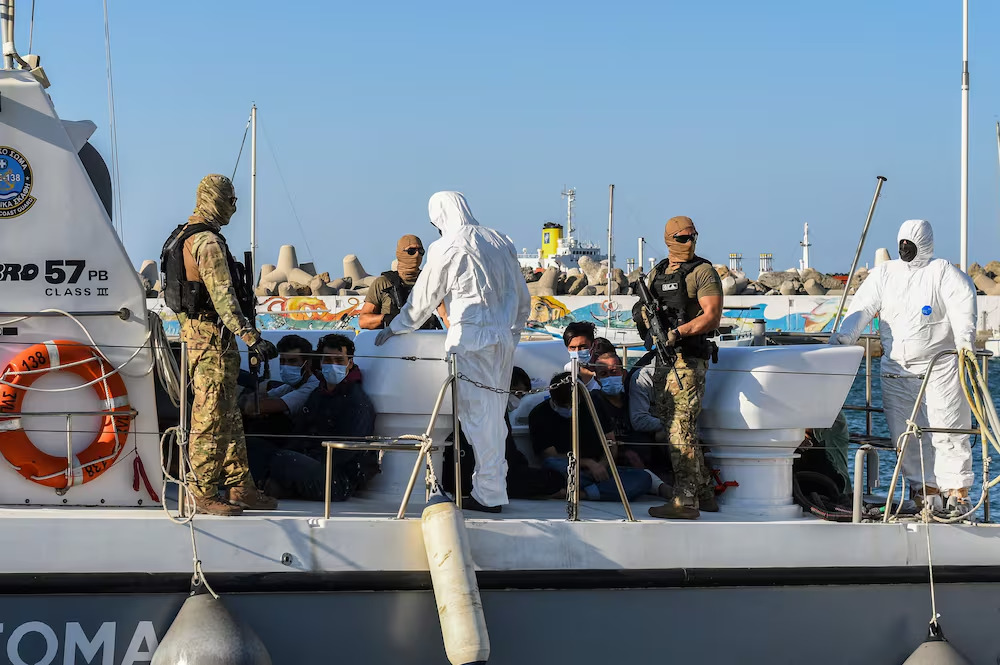"The letter is a response to the political theatre that follows the death of 200 migrants in Lampedusa"
- Last February, the Italian island of Lampedusa hosted a day of social mobilisations against the European Union’s immigration policy. It is a Lampedusa Charter that symbolically collects the island and claims the human rights of migrants. We've been with activist Francesco Borselino, who was involved in the process.

Europe needs an in-depth debate on immigration policy. The unworthy attitude of the Spanish Police against migrants at the border controls in Melilla and Ceuta in recent months has caused a great stir. Migration has also been one of the main themes in the campaign of the European elections. And in Italy, the alarm jumped after the accident that took place last October on the coast of Lampedusa. The boat, which headed to the Italian island closest to Africa, sank and more than 200 people died of suffocation. The questions arising from the tragedy and mismanagement of the Italian Government mobilised many social movements in defence of the migrants from Lampedusa.
During three days of camping, they wrote the Lampedusa Charter and since then they have presented it in cities of Italy and Europe. Borselino was in the solidarity camp of the village, where Kevin Kee remained.
Why did you see the need to create the Lampedusa Charter?
It is a response to the political theatre that took place following the tragedy of Lampedusa in Barcelona. The Government acted in a false way, giving great importance to the tragedy, but after a month it forgot everything and maintained the policies that were always exclusive. The letter was the answer to this media farce, because we knew that there would be no real change in the institutions.
What did you ask in the letter?
First of all, all the movements decided that to structure the letter we had to camp in Lampedusa, because of the symbolic meaning of the place. In the letter that has been drawn up, it is stated that the basis for changing immigration policy must be laid down. In a way, we have divided the text into two parts: the theoretical and the practical, and the objective is to achieve the connection between both sides.
In the theoretical aspect, we claim human rights and claim as fundamental rights the freedom of movement, the choice of the place and the permanence in the agreed place.
On the other hand, we say that the necessary mechanisms must be put in place to implement these ideas, and we call for the elimination of other existing mechanisms that threaten the human rights of immigrants. For example, we see the need for the demilitarisation of Lampedusa and other border areas. We also call for an improvement in the situation of prevention centres for immigrants, which invest the money spent from institutions (centres, antennae and drones to identify boats…) in the plans for the reintegration of migrants.
A lot has been said about these immigrant centres, what kind of facilities have been found in Lampedusa?
It maintains immigrants in situations of expulsion at the borders of Italy, Spain, France and Portugal, and in the Schengen agreement of 1995 these concentration points were defined as European Union instruments for the development of immigration policy. But the reality is much darker: these centres often rely on private companies and persecution and humiliation of migrants are systematic. This has been reported on several occasions by S.O.S.
To put it mildly, the cutbacks in these times of crisis have further worsened the living standards of the centres. They are often crowded and there are no plans for reinsertion or education for children. Their situation is becoming very serious in the centres, unfortunately we know quite a few cases of people who have attempted suicide.
Is Lampedusa an exception or is the situation similar in other centres?
Lampedusa is not an exception, but the most brutal example, but in the centre of Augusta, in Sicily, the situation is also rather harsh, according to the migrants. The number of people inside is significantly higher than what the center can assume and the situation is unsustainable. After all, we are talking about people and there is no right to have people clustered in the centres as if they were animals.
How do you see Italian society facing this problem?
Unfortunately, the problem of migrants is not on the agenda of most Italians, and when we work on the issue we work with a lot of fear and ignorance. We believe that the press is primarily responsible. The response to different interests systematically generates fear of immigrants and makes in-depth reflection and debate about immigrants in society impossible.
A debate on European immigration policy is therefore needed.
These European policies are those that create situations of harassment in countries such as Lampedusa, Ceuta or Melilla. As long as these policies are not changed, the Melilla fences will continue to be damaged and the casualties such as that of Lampedusa will continue constantly. A debate at European level is needed to address the issue of migration. Unfortunately, we do not see the political will for change, so we will continue to camp and make statements such as those made in Lampedusa.
Kritika artean abiatu dira Gasteizko Arana klinika zena Nazioarteko Babes Harrera Zentro bilakatzeko obrak. Ez auzokideak, ez errefuxiatuekin lan egiten duten gobernuz kanpoko erakundeak, ez PSEz bestelako alderdi politikoak ez daude ados proiektuarekin: makrozentroen ordez,... [+]
"Segurtasun gehiago, inmigrazio gutxiago". Bruno Retailleau barne ministro frantsesa argi mintzatu da, kargua hartu berritan. Etorkinen gaineko kontrola azkartu nahi du Michel Barnier lehen ministro eskuindar-kontserbadorearen gobernuak, eta jada Retailleauk aitzinatu... [+]
Europar Batasunean berriki onartu den Migrazio Itunak, asko zaildu dizkie gauzak euren herrialdetik ihesi doazen eta asiloa eskatzen duten pertsonei. Eskuin muturraren tesiak ogi tartean irentsita, migratzaileentzako kontrol neurri zorrotzagoak onartu dituzte Estrasburgon,... [+]
Migratzaileen kopurua anitz emendatu da Irun eta Hendaia arteko pasabidean. Irungo Harrera Sareak ohartarazi duenez, otsailean 600 pertsona lagundu dituzte, iaz, urte osoan 2.700 izan zirelarik. Iragan urtarrilean, 2.700 etorkin heldu dira Kanariar Uharteetara, egunero 80... [+]
























